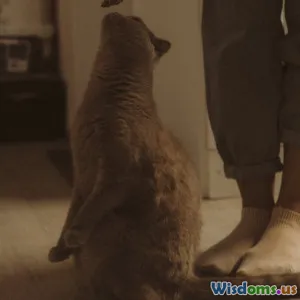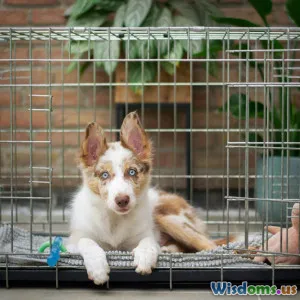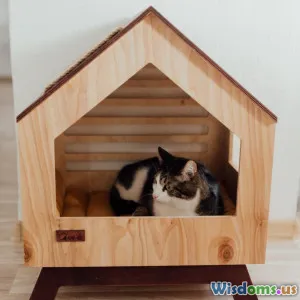
Is Your Cat Actively Avoiding the Litter Box? Here's Why
8 min read Discover why your cat might be avoiding the litter box and learn practical solutions to restore harmony at home. (0 Reviews)
Is Your Cat Actively Avoiding the Litter Box? Here's Why
Cats are beloved companions known for their cleanliness and fastidious nature, especially when it comes to grooming and litter box habits. So, when a cat starts to avoid the litter box, it can bewilder owners and quickly turn into a stressful problem. Understanding why your cat is actively steering clear of its litter box is essential not only for maintaining a clean home but also for preserving your feline friend’s health and happiness.
Introduction: The Mystery of the Missing Litter Box Visits
If you've noticed your once fastidious cat suddenly choosing the carpet, couch, or other forbidden spots instead of the litter box, you’re not alone. Litter box avoidance happens in approximately 10% of house cats—according to veterinary behavioral studies—and can stem from a variety of causes ranging from medical issues to emotional stress. This isn’t just a behavioral quirk; it’s a cry for help. By diving into the underlying reasons, you can restore your cat's comfort and protect its wellbeing.
Medical Causes: The Silent Yet Urgent Warning Signs
Urinary Tract Infections and Other Illnesses
Health issues are the leading causes of litter box avoidance. Cats with urinary tract infections (UTIs), crystals in their urine, bladder inflammation, or kidney problems often associate pain or discomfort with urination, leading them to avoid the box.
Real-World Insight: Dr. Sophia Grewal, DVM specializing in feline behavior, notes, “Cats experiencing painful urination will often begin eliminating outside the box to avoid the pain associated with it, signaling an urgent need for veterinary care.”
If your cat exhibits frequent attempts to urinate, straining, blood in urine, or vocal distress during bathroom visits, a prompt veterinary visit is critical.
Arthritis and Mobility Issues
Older cats or those with arthritis may find getting into and out of litter boxes painful, especially if the box has high sides.
Digestive Disorders
Conditions like inflammatory bowel disease can cause diarrhea or sudden urges for defecation, which may lead to accidents if the cat cannot reach the box in time.
Environmental Factors: When the Surroundings Don’t Feel Right
Litter Box Cleanliness and Type
Cats have heightened olfactory senses and disdain dirty litter boxes. Some cats will reject a box that hasn’t been scooped daily or smells strongly of ammonia from waste buildup.
Moreover, changes in the type of litter—such as switching from unscented clay to scented or clumping litter—can cause aversion. One study showed that 42% of cats reject litter types that are different from what they’re accustomed to.
Litter Box Accessibility and Location
Cats prefer quiet, private locations. Boxes placed near loud appliances, busy family rooms, or where other pets can bother them may discourage use.
Size and shape matter, too. Some cats avoid boxes that are too small, have covered lids making them feel trapped, or have difficult entries for older cats.
Multi-Cat Household Dynamics
Territorial disputes and social stress can cause cats to avoid shared litter boxes. According to the American Association of Feline Practitioners, the recommended rule is one litter box per cat plus one extra to minimize conflict.
Behavioral and Emotional Stressors: The Invisible Triggers
Changes in Household Routine
Cats thrive on routine. Moving house, adding a new family member or pet, loud noises, or construction in the neighborhood can cause stress, prompting litter box avoidance.
Negative Associations
If a cat has been startled or startled itself near the litter box—for instance, due to a loud noise or interruption—it can develop a negative association and avoid the box afterward.
Anxiety and Psychological Conditions
Cats with anxiety disorders or feline compulsive behaviors may also display inappropriate elimination.
How to Resolve Litter Box Avoidance: Practical Steps
Rule Out Medical Issues First
Before behavioral adjustments, get a complete veterinary exam to exclude or treat medical conditions.
Maintain Impeccable Hygiene
Scoop waste at least once daily and clean the entire litter box weekly. Use unscented clumping litter preferred by most cats.
Optimal Litter Box Setup
- Use multiple boxes placed in quiet, accessible locations.
- Ensure boxes are large enough for your cat to turn comfortably.
- Consider open litter boxes for cats who dislike covered ones.
- For elderly cats, low-entry boxes reduce mobility challenges.
Restore Routine and Reduce Stress
- Keep feeding, playtime, and litter box cleaning on a schedule.
- Provide hiding spots and vertical spaces to help cats feel secure.
- Use feline calming products, such as pheromone diffusers (e.g., Feliway), to reduce anxiety.
Positive Reinforcement
Reward your cat with treats or affection when they use the litter box correctly to reinforce good behavior.
Conclusion: A Call to Compassion and Action
Litter box avoidance is seldom a matter of a “naughty” cat—it’s typically a signal that something is amiss medically, environmentally, or emotionally. By tuning into your cat’s needs and applying compassionate, informed strategies, you can help return your feline friend to their clean, reliable habits. When in doubt, seek veterinary advice early, because timely intervention can prevent long-term behavioral problems. Remember: a happy cat in the litter box means a happier home for everyone.
References
- Cummings School of Veterinary Medicine, Tufts University, Feline Behavior Studies.
- American Association of Feline Practitioners. Litter Box Management Guidelines, 2020.
- Dr. Sophia Grewal, DVM, Feline Behavior Specialist interviews, 2023.
- Overall, K. Behavioral Problems of the Dog and Cat. Saunders, 2013.
Empowered with knowledge, your cat's future on their trusted litter box looks bright.
Rate the Post
User Reviews
Popular Posts




















